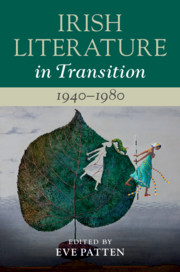Book contents
- Irish Literature in Transition, 1940–1980
- Irish Literature in Transition
- Irish Literature in Transition, 1940–1980
- Copyright page
- Contents
- Contributors
- Series Preface
- General Acknowledgements
- Introduction
- Part I After the War: Ideologies in Transition
- Part II Genres in Transition
- Part III Sex, Politics and Literary Protest
- Part IV Identities and Connections
- Chapter 13 State, Space and Experiment in Irish-Language Prose Writing
- Chapter 14 Anglo-Ireland: the Big House Novel in Transition
- Chapter 15 American–Irish Literary Relations
- Chapter 16 ‘Home Rule in Our Literature’: Irish–British Poetic Relations
- Part V Retrospective Frameworks: Criticism in Transition
- Index
Chapter 13 - State, Space and Experiment in Irish-Language Prose Writing
from Part IV - Identities and Connections
Published online by Cambridge University Press: 28 February 2020
- Irish Literature in Transition, 1940–1980
- Irish Literature in Transition
- Irish Literature in Transition, 1940–1980
- Copyright page
- Contents
- Contributors
- Series Preface
- General Acknowledgements
- Introduction
- Part I After the War: Ideologies in Transition
- Part II Genres in Transition
- Part III Sex, Politics and Literary Protest
- Part IV Identities and Connections
- Chapter 13 State, Space and Experiment in Irish-Language Prose Writing
- Chapter 14 Anglo-Ireland: the Big House Novel in Transition
- Chapter 15 American–Irish Literary Relations
- Chapter 16 ‘Home Rule in Our Literature’: Irish–British Poetic Relations
- Part V Retrospective Frameworks: Criticism in Transition
- Index
Summary
This chapter focusses on developments in Irish-language prose, drawing attention to innovation in subject matter, literary form and language, and also the persistent and deep-seated anxieties which writers such as Máirtín Ó Cadhain voiced about the future of the Irish language as a creative medium. This chapter considers the context and impact of the language question on Irish-language writing at this time, also examining the emergence of Irish periodicals and independent publishing companies. Ó Cadhain was a particularly prolific publisher in both of these formats, with his 1949 novel Cré na Cille standing out in particular as one of the few internally acclaimed modernist texts that emerged in this era. However, Ó Cadhain was not the only avant-garde writer in Irish, and this chapter also discusses some of the most innovative prose writing to emerge in these decades by non-native speakers of Irish Diarmaid Ó Súilleabháin, Breandán Ó Doibhlin and Eoghan Ó Tuairisc, whose work was collectively characterised by critic Lydia Groszewski as ‘Turgnamhacht na Tríonóide’ (The Experimentalism of the Trinity). It then discusses a generation of new Gaeltacht authors like Siobhán Ní Shúilleabháin, who broke new ground in this period, particularly in their depiction of the social aspirations of young rural women.
Keywords
- Type
- Chapter
- Information
- Irish Literature in Transition, 1940–1980 , pp. 235 - 254Publisher: Cambridge University PressPrint publication year: 2020
- 1
- Cited by



